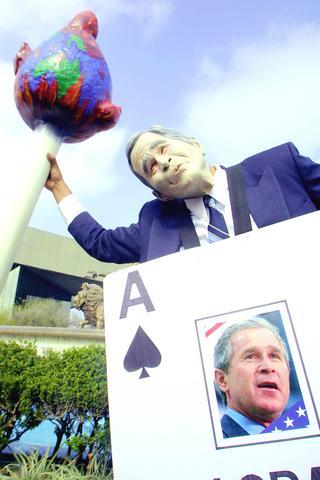A series of diplomatic rows exposing Latin American resentment of US foreign and domestic policies threatens to overshadow a major regional summit designed to promote cooperation.
The Summit of the Americas, which was to begin in the Mexican city of Monterrey yesterday, was called to discuss social development in a region with 220 million poor people.

PHOTO: AFP
But development has been conspicuously absent from the agenda in the lead-up to the two-day meeting, which has been marked by simmering tensions and open squabbles.
US president George W. Bush faces more than 30 other heads of state, many of whom oppose his policy towards Latin America.
One issue that could sour the gathering is the requirement that foreign visitors be fingerprinted and photographed at US airports. Some 27 states are exempt from the measures, but no Latin American country is among them.
Brazil is one of the most strident dissenters, and has retaliated by ordering the same measures to be applied to US visitors, causing nine-hour queues and official protests from the US. The tit-for-tat move has been hugely popular in Brazil, which is also the main thorn in US plans to negotiate a free trade deal extending from Alaska to Tierra del Fuego.
Brazilian president Luiz Inacio "Lula" da Silva is scheduled to meet Bush on the sidelines of the summit. But he is not the only Latin American president under pressure to stand up to what many view as the US' bulldozer tactics.
Last week, Argentine president Nestor Kirchner said he would win the debate with Bush in their one-on-one meeting in Monterrey "by a knockout".
His comments came days after high-ranking US officials urged Argentina to speed up the fulfilment of debt-refinancing conditions in the wake of the country's economic crisis, and criticized the failure of its foreign minister to meet dissidents on a recent trip to Cuba.
The chief minister of the Argentine cabinet, Alberto Fernandez, called the comments "impertinent."
In the absence of Fidel Castro, who was not invited because Cuba is not a member of the Organization of American States, the most vehement anti-US voice is likely to be Venezuela.
Venezuelan president Hugo Chavez last week called the US national security adviser, Condoleezza Rice, "a real illiterate" after she condemned his closeness to Castro and reluctance to call a leadership referendum.
The left-wing former paratrooper promised to speak his mind.
"The time of cowardly governments on this continent subordinate to the dictates of Washington is coming to an end," he said.
Bush should find some solace, however, in the summit's host, Mexican president Vicente Fox. Fox has welcomed the US leader's proposal to provide millions of illegal immigrants, most of them Mexicans, with temporary work visas.
But even this prize is qualified by the fact that it faces some opposition in the US Congress, and falls far short of the amnesty Fox had sought. It is more of a unilateral bone-throwing exercise than a victory for diplomacy.
Mexico's former ambassador to the UN, Alfonso Aguilar Zinser, said the plan was a sign that the US treated Latin America as its "backyard."

A fire caused by a burst gas pipe yesterday spread to several homes and sent a fireball soaring into the sky outside Malaysia’s largest city, injuring more than 100 people. The towering inferno near a gas station in Putra Heights outside Kuala Lumpur was visible for kilometers and lasted for several hours. It happened during a public holiday as Muslims, who are the majority in Malaysia, celebrate the second day of Eid al-Fitr. National oil company Petronas said the fire started at one of its gas pipelines at 8:10am and the affected pipeline was later isolated. Disaster management officials said shutting the

US Vice President J.D. Vance on Friday accused Denmark of not having done enough to protect Greenland, when he visited the strategically placed and resource-rich Danish territory coveted by US President Donald Trump. Vance made his comment during a trip to the Pituffik Space Base in northwestern Greenland, a visit viewed by Copenhagen and Nuuk as a provocation. “Our message to Denmark is very simple: You have not done a good job by the people of Greenland,” Vance told a news conference. “You have under-invested in the people of Greenland, and you have under-invested in the security architecture of this

Japan unveiled a plan on Thursday to evacuate around 120,000 residents and tourists from its southern islets near Taiwan within six days in the event of an “emergency”. The plan was put together as “the security situation surrounding our nation grows severe” and with an “emergency” in mind, the government’s crisis management office said. Exactly what that emergency might be was left unspecified in the plan but it envisages the evacuation of around 120,000 people in five Japanese islets close to Taiwan. China claims Taiwan as part of its territory and has stepped up military pressure in recent years, including

UNREST: The authorities in Turkey arrested 13 Turkish journalists in five days, deported a BBC correspondent and on Thursday arrested a reporter from Sweden Waving flags and chanting slogans, many hundreds of thousands of anti-government demonstrators on Saturday rallied in Istanbul, Turkey, in defence of democracy after the arrest of Istanbul Mayor Ekrem Imamoglu which sparked Turkey’s worst street unrest in more than a decade. Under a cloudless blue sky, vast crowds gathered in Maltepe on the Asian side of Turkey’s biggest city on the eve of the Eid al-Fitr celebration which started yesterday, marking the end of Ramadan. Ozgur Ozel, chairman of the main opposition Republican People’s Party (CHP), which organized the rally, said there were 2.2 million people in the crowd, but